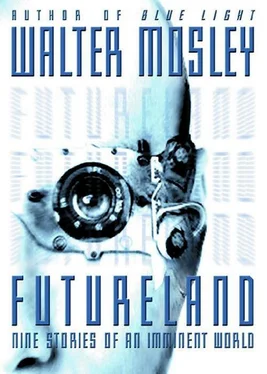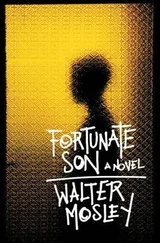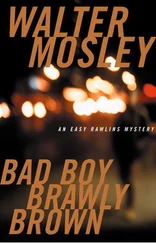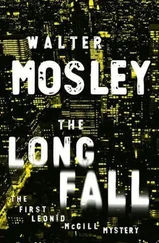“That’s more like it,” Frendon said with a sigh.
“Do you know why you’re here?”
“Because you won and I lost,” Frendon replied, quoting an old history lesson he learned while hiding from the police in an Infochurch pew.
“You have been charged with the killing of Officer Terrance Bernard and the first-degree assault of his partner, Omar LaTey.”
“Oh.”
“Do you have counsel?”
“What do I call you?” Frendon asked in the middle of a deep knee bend.
“The court will be adequate.”
“No, The Court, I don’t have any money.”
“Do you have counsel?”
“I don’t have money.”
“And so you cannot afford counsel? This being the case, you will have a court-appointed counsel.”
A large Glassone tile on the left side of The Court slid away and a smaller console, this one bright red and fitted with a small blue screen, slowly emerged from beneath the floor. The blue screen came on and a very real-looking photo-animae face of an attractive black woman appeared.
“Counsel for the defense, AttPrime Five, logging onto docket number 452-908-2044-VCF,” the woman said in a most somber voice. After a ten-second delay she said, “We may proceed.”
“Mr. Blythe,” The Court said. “What is your plea?”
“Not guilty,” the African-American image offered.
“Are there witnesses?” The Court asked The Defense.
Frendon knew what was coming next. There would be thirty or forty conversations held by field court reporters half the size of The Defense (who was no more than a meter and a half in height). Eyewitnesses, character witnesses, officials who have dealt with the defendant, and the arresting officers would have been interrogated within eight hours of the shoot-out. Each witness would have agreed to a noninvasive neural link for the duration of the fact-gathering examination. Each witness’s psychological profile would have been prepared for defense and prosecution cross-examination and a lie detector installed in each reporter would have assured that only the truth would be presented in court. This procedure had been in effect in Sacramento for the last eight years. The only difference in Frendon’s case was that before Sac’m, the information had been given to flesh-and-blood judges, juries, and lawyers.
“I’d like to dispense with this aspect of the trial,” Frendon said.
Both cowl and woman regarded him.
“You wish to plead guilty?” they asked as one.
“I accept the fact that my firing a weapon caused the death and damage to the police officers,” Frendon said calmly. “But I wish to claim extenuating circumstances which will prove me innocent of criminal intent.”
During the high-pitched binary conferencing between Court and Defense, Otis Brill tapped Frendon’s wrist and asked, “What are you up to?”
“Just makin’ my case, Officer Brill.”
“You can’t fool these machines, son. They know everything about you from cradle to grave.”
“Really?”
“They mapped your chromes the first hour you were here. If there was insanity in them genes you wouldn’t’a ever stood trial.”
After six minutes had passed The Court asked, “What is your evidence?”
“First I want to fire my lawyer.”
“You cannot.”
“I can if she’s unqualified.”
“AttPrime Five is as qualified as The Court to try your case.”
“How’s that?” Frendon asked.
“She has the same logic matrix as does this unit, she has access to the same data as we do.”
“But you’re three times her size,” Frendon replied reasonably. “You must have some kind of advantage.”
“This unit contains the wetware neuronal components of ten thousand potential jurors. This, and nothing else, accounts for our disparity in size.”
“You got ten thousand brains in there?”
“Biologically linked and compressed personalities is the proper term,” The Court said.
“And you,” Frendon asked, “are you a compressed personality?”
“We are an amalgam of various magistrates, lawyers, and legislators created by the biological linkage and compression system to be the ablest of judges.”
“And prosecutors,” Frendon added.
“It has been decreed by the California Legislature that the judge is best equipped to state the prosecution’s case.”
“But,” Frendon asked, “isn’t the judge supposed to be a representative of blind justice? If The Court is prosecuting, doesn’t that mean that The Court assumes my guilt?”
“Are you legally trained, Mr. Blythe?” The Court asked.
“I spent more than eleven of my twenty-seven years as a guest of the state.”
“Are you legally trained, Mr. Blythe? We have no record of you having such an educational background.”
“The slave studies his masters.”
“Without legal training you cannot, by statute, represent yourself.”
“Without a fair and impartial lawyer I can’t be tried at all.”
“Your attorney is qualified.”
“Has she independently studied my case? Has she developed separate strategies? Has she found information counter to the evidence presented by the prosecution?” Frendon struck a dramatic pose that left Otis agape.
“Evidence in the modern court is objective,” The Court intoned.
“What about my extenuating circumstances?”
A period of fifteen minutes of computer deliberation, punctuated by brief blasts of data between computers, followed.
“What are you doin’, Blythe?” Otis Brill asked.
“Tryin’ to make it home for dinner.”
“You ain’t gonna beat this rap. You goin’ down.”
“From where I sit there’s only up.”
“You’re crazy.”
Frendon sat cross-legged on the floor rather than risk the restraint straps of RMD 27. He watched the frozen images of Court and Defense while enjoying the spaciousness of the courtroom and the sporadic fluttering of dying birds above. There was a certain security he got from the solidity of the glassy Glassone floor. All in all he was completely happy except for the fiber-optic NeuroNet cable attached to the back of his skull. But even this predicament gave him some satisfaction. That cable alone was worth more money than any twelve Backgrounders could con in a cycle. If he could walk out of the courtroom a free man maybe he could also carry a length of this cable with him.
Frendon was White Noise. The only homes he had ever known were governmental institutions and the octangular sleep tubes of Common Ground. He never had a bedroom or a bicycle. He never had a backyard. Frend, as he was known, traveled the underground pathways eating the rice and beans served by the state for every meal every day. By his sixteenth birthday he had been convicted in juvenile courts of more than a dozen violent and felonious crimes. This criminal history kept him from entering the cycles of employment, which were legally assured by the Thirty-sixth Amendment to the Constitution. Frendon’s constitutional right was blocked by the mandatory publication of his criminal history by electronic news agencies. The legality of this record was backed up by the Supreme Court when it decided that reliance by employers on news articles about criminals, even juvenile criminals, was protected by the Fourth Amendment.
Frendon never knew his parents. He never had a chance to rise to street level. But he was no fool either. In the state prisons and detention centers he learned, via monitor, about the law and its vagaries. He studied tirelessly at Infochurch how to circumvent legal conundrums and maintain his freedom.
As a matter of fact he had become so well versed in the legal wiles of automatic justice that for some time now he had been in direct contact with Tristan the First, Dominar of the Blue Zone located on Dr. Kismet’s private island nation, Home. Together they had come up with a plan to use in one of the first fully automated cases.
Читать дальше












